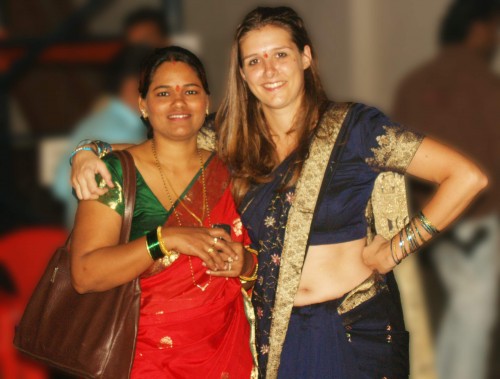10/02/2013
Why in India most people are vegetarian?
My mother gave me an idea. She was in a great shape during her last trip to India and asked me about a dozen of questions every minute: and why is this woman dressed like that and why is this guy doing this and why this and why that? A bit annoyed by the number of questions and even more because I didn’t have the answer, I started making up (stupid) answers, which she kinda believed….
And then I thought that if my mother asks herself these questions, maybe others do too! And here is a series of posts like Why are Indians vegetarian? Why do Indians worship the cow? Why do Indians eat with their fingers? Why do Indians have red marks on the forehead? Why do Sikhs wear turbans? etc.
Enjoy the reading!
Why are Indians vegetarians?
Even after seven years of being able to order chicken in most of the restaurants I have been to, I'm the first one to claim that Indians are vegetarians. Is it because I had never met one before?
Because as a matter of fact less than half of the Indian population is vegetarian! (1) Of course in numbers it is very high since one person out of 6 on this planet is Indian; consequently 70% of the vegetarians in this world live in India. (2)
The concept of the non-veg (non-vegetarian) versus veg (vegetarian) is quite peculiar here.
The pure veg, for instance, usually won’t drink alcohol. Do you see the link? I for one assume that if the pure veg is respectful enough of the rules to not eat meat he will also abide by by other rules, like regarding drinks…
Or when an Indian tells you he is a Brahmin, there are great chances (55%) he is veg, unless he is a Kashmiri Brahmin (they eat mutton) or a West Bengali one (they are fond of fish). (3)
Another example is how the pure non-veg will blow a fuse if you serve him a meal without meat or fish – it's completely inconceivable for him.
I just fell from the sky when my favorite ex-Indian almost cancelled our trip to Hampi when he discovered (at the last minute, of course) that it was a sacred place. And who says sacred – I discovered it that day – also says no meat and no alcohol! 
There is also the non-veg who, to clear his conscience, will deprive himself of meat on the special days of worship of his God (when he doesn’t fast completely). And there are other funny rules like when my Hindu colleague cannot eat garlic nor onion on Tuesdays, Hanuman’s day.
So how did Indians become veg?
There was a time (Vedic to be precise) when Brahmins (the priests), who today are the most ardent defenders of the sacred cow, practiced religious sacrifices of the said cow. But it was for its good: it was already revered at that time and it enabled the animal to move up faster in the reincarnation cycle. In the texts (particularly the Book of Manu) non-vegetarianism was quite framed: the killing of animals should be as part of a ritual sacrifice, only certain animals should be slaughtered and we could eat their meat only for a particular purpose. (4)
A few centuries BC, Lord Mahavir, a Hindu of blue blood, gave up all his belongings (including his clothes) at 30 and went meditating for twelve years. He came back with the Jainism doctrine and its principle of nonviolence which is quite extensive as it applies even to bacteria. Jains cannot eat meat, fish, egg, honey, onions and garlic (which arouse sexual desire), vegetables that grow in the ground (potatoes, carrots etc) nor fruits still on the tree.
Almost at the same time, the prince Gautama Buddha renounced his lifestyle at 29 and after six years of meditation in the forest, he stated the principles of Buddhism, including non-violence. History repeats itself... Except that Buddhists are slightly less stringent than Jains: it is not forbidden to eat meat but to kill the animal...
A few centuries later, as the Hindu Emperor Asoka was ruling on the largest empire that was ever built in India, he woke up one morning disgusted with all the violence caused by the wars and converted to Buddhism, enjoining his people to do the same. "No living being must be slaughtered or offered in sacrifice."
As Buddhism threatened Hinduism, Hindu priests bounced back and encouraged the practice of vegetarianism which thus spread. Cows began to prosper. One cannot say the same of Jains and Buddhists (which are now respectively 4 and 8 millions in India (5)). Pigs and goats also went through a flourishing era until the Muslims started coming in in the 8th century (6), some 9 centuries after India had turned veg (except for warriors and Kings- not crazy these ones! – and Untouchables who ate whatever they could find). (7)
Next we will see Why do Indians worship cows?
(1) 31% are pure vegetarian and 9% eat eggs. Source: http://hindu.com/2006/08/14/stories/2006081403771200.htm
(2) http://www.hendersonsofedinburgh.co.uk/vegetarianism-a-brief-history.php
(3) Lord Mahavir (599 B.C. - 527 b.c. Gautama Buddha (563 BC - 483 BC), King Asoka (304 B.C. - 232 B.C.) )http://www.indiacurry.com/faqhistory/hfaqbeef.html
(4) http://www.asian-recipe.com/india/food-culture-history.html
(5) http://censusindia.gov.in/Census_And_You/religion.aspx
(6) http://www.bbc.co.uk/religion/religions/islam/history/mughalempire_1.shtml
(7) http://www.thehindu.com/features/metroplus/society/a-matter-of-tastes/article5003956.ece
08:00 Posted in Why in India... | Permalink | Comments (0) | Tags: india, food, vegetarian, non-vegetarian, pure vegetarian, veg, non-veg, meat, cow, pig, fish, jain, buddhist, hindu, religion, buddha, nonviolence, asoka, sacrifice, holy cow, sacred cow | ![]() Facebook | |
Facebook | |
06/03/2011
Travelling with an Indian is a great experience!!
Note: the following remarks come from personal experiences and exchanges and if it is very general, I think that it is quite true. One can certainly say also a lot on the French who travel…
First: choosing the destination. The Indian is not an explorer at heart and will prefer to avoid the unknown regions – so if parents, friends went there (or better even better live there), it is preferable.
Second: the visa. Indians need visas to go about everywhere. And though in the majority of the countries the procedure is not too complicated – and on top of that most of Indians use the services of an agent, time management to get a visa is not easy easy. As for everything else, waiting for the last minute is preferable.
Once on the holiday spot, the paramount question will be the food. If the Indian is vegetarian, I don’t want to even mention the situation… In any case, after a couple of days, the Indian will want to visit about all the Indian, or Chinese, restaurants that he will come across. He will not force his partner to share his dinner, since anyway eating is about eating – you really have to be French to think that dinner is more a moment of sharing, talking, than just gulping food.
Very recently, my “own” Indian really played with my nerves (this is my point of view, not his obviously). After obtaining his visa in a record time (4 days before departure), he looked at the weather on Internet, discovered that the monsoon was starting there and panicked – and yes we had checked before and we knew we could expect some rain but not to the point to ruin holidays (apparently he forgot that)… So he mentioned changing the destination. Or at least suggested that I call my friend who lives there (yes, even if she is on holiday in the Vietnamese countryside, she has access to facebook not?) so that she tells me the weather. One week in advance…
If I did not have him, I would have to invent him…
08:00 Posted in My stories in India | Permalink | Comments (0) | Tags: india, indians, travelling, visa, food | ![]() Facebook | |
Facebook | |
07/30/2010
Introduction
So… A few things about me...
I have been blogging for almost 4 years and just thought of going wild: do it also in English!
Hope I’ll manage, if it is not too time requiring…
I am Emilie, almost 28, French. I moved to India for a 2-year job in Pune (in polymers). Loved it there but had to face a situation of moral /sexual harassment from an ugly fat bold Indian…
I survived thanks to my boyfriend, Shiv, who showed me that all guys where not like the other pig (though I must confess the number of sexually starving guys is HUGE in this country; and adding that white skin = easy sex (in their mind), it makes it a little difficult to deal with…).
I moved to Mumbai one and half year ago, to work for a pet food company. Yes, there are dogs and cats in India, and not only wild ones.
I really like the job (marketing). Hence I am staying and liking it.
My accent has totally turned Indian. I also understand hindi ok though I don't speak.
I shake my head to say yes, when talking to Indians.
I have travelled a LOT in India.
I still don’t like spicy food but enjoy tandoori.
I don't wear sarees, cause it's too hot (except for special occasions - see photo below)
I am a young white business woman so I don’t really suffer from prejudges with my colleague: I am more of the species of ETs for them.
A frequently asked question: “has your family moved to India with you?” Well…
See you later!
Emilie

10:21 Posted in My stories in India | Permalink | Comments (0) | Tags: india, mumbai, pune, food, spices, saree | ![]() Facebook | |
Facebook | |














